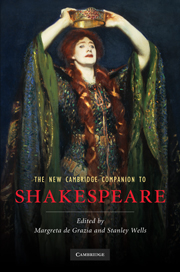Book contents
- Frontmatter
- 1 The traces of Shakespeare’s life
- 2 Shakespeare’s reading
- 3 Shakespeare’s writing: from manuscript to print
- 4 The theatre of Shakespeare’s London
- 5 The transmission of Shakespeare’s texts
- 6 Shakespeare and language
- 7 Shakespeare the poet
- 8 Shakespeare’s comedies
- 9 Shakespeare’s tragedies
- 10 Shakespeare’s English history plays
- 11 Shakespeare’s classical plays
- 12 Shakespeare’s tragicomedies
- 13 Shakespeare, religion and politics
- 14 Shakespeare and race
- 15 Shakespeare, sexuality and gender
- 16 Shakespeare on the stage
- 17 The critical reception of Shakespeare
- 18 Shakespeare and popular culture
- 19 Shakespeare and globalization
- 20 Shakespeare and media history
- 21 Shakespeare: reading on
- Index
5 - The transmission of Shakespeare’s texts
Published online by Cambridge University Press: 28 January 2011
- Frontmatter
- 1 The traces of Shakespeare’s life
- 2 Shakespeare’s reading
- 3 Shakespeare’s writing: from manuscript to print
- 4 The theatre of Shakespeare’s London
- 5 The transmission of Shakespeare’s texts
- 6 Shakespeare and language
- 7 Shakespeare the poet
- 8 Shakespeare’s comedies
- 9 Shakespeare’s tragedies
- 10 Shakespeare’s English history plays
- 11 Shakespeare’s classical plays
- 12 Shakespeare’s tragicomedies
- 13 Shakespeare, religion and politics
- 14 Shakespeare and race
- 15 Shakespeare, sexuality and gender
- 16 Shakespeare on the stage
- 17 The critical reception of Shakespeare
- 18 Shakespeare and popular culture
- 19 Shakespeare and globalization
- 20 Shakespeare and media history
- 21 Shakespeare: reading on
- Index
Summary
A theatre-goer who had seen 1 Henry IV when it first appeared on the stage in London might subsequently have ventured to the area around St Paul's Churchyard - at the time the centre of the English book trade - in search of a copy of the play. The printed text on offer there would have been strikingly different from its modern counterpart. For one thing, the title would not have been our compact 1 Henry IV but rather the more elaborated The History of Henry the Fourth; With the battle at Shrewsbury, between the King and Lord Henry Percy, surnamed Henry Hotspur of the North. With the humorous conceits of Sir John Falstaff. This title serves not just to identify the play, but also acts as a kind of 'teaser', flagging up the exciting content of the book. An even more striking aspect of the original edition of the play, from a modern perspective, would be the fact that nowhere in the book is Shakespeare identified as the author. Like many other plays published in the closing years of the sixteenth century, 1 Henry IV appeared without any indication of who had written it.
The title page of the first edition of 1 Henry IV alerts us to the fact that the Renaissance was a period of cultural transition in England. The London theatre scene was an adventurous innovation, and it was not entirely clear whether the products of this new commercial venture should even be considered worthy of being preserved in print, a medium which had hitherto in large measure been used to disseminate works of a devotional or practical nature.
- Type
- Chapter
- Information
- The New Cambridge Companion to Shakespeare , pp. 61 - 76Publisher: Cambridge University PressPrint publication year: 2010
- 2
- Cited by



